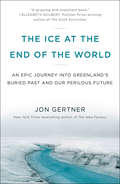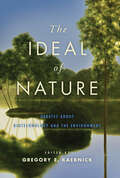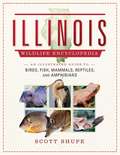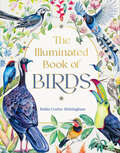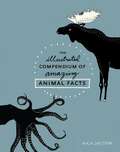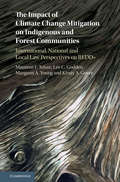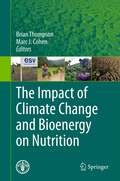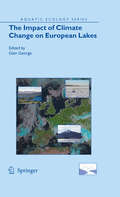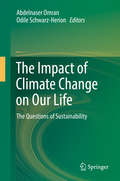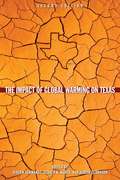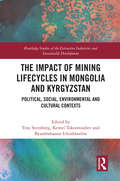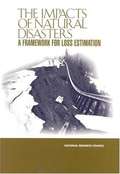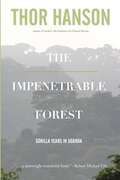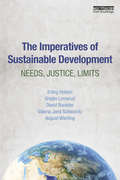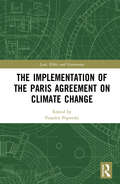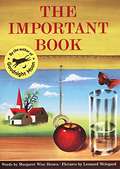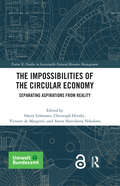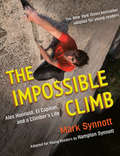- Table View
- List View
The Ice at the End of the World: An Epic Journey into Greenland's Buried Past and Our Perilous Future
by Jon GertnerA riveting, urgent account of the explorers and scientists racing to understand the rapidly melting ice sheet in Greenland, a dramatic harbinger of climate change“Jon Gertner takes readers to spots few journalists or even explorers have visited. The result is a gripping and important book.”—Elizabeth Kolbert, Pulitzer Prize–winning author of The Sixth Extinction Greenland: a remote, mysterious island five times the size of California but with a population of just 56,000. The ice sheet that covers it is 700 miles wide and 1,500 miles long, and is composed of nearly three quadrillion tons of ice. For the last 150 years, explorers and scientists have sought to understand Greenland—at first hoping that it would serve as a gateway to the North Pole, and later coming to realize that it contained essential information about our climate. Locked within this vast and frozen white desert are some of the most profound secrets about our planet and its future. Greenland’s ice doesn’t just tell us where we’ve been. More urgently, it tells us where we’re headed. In The Ice at the End of the World, Jon Gertner explains how Greenland has evolved from one of earth’s last frontiers to its largest scientific laboratory. The history of Greenland’s ice begins with the explorers who arrived here at the turn of the twentieth century—first on foot, then on skis, then on crude, motorized sleds—and embarked on grueling expeditions that took as long as a year and often ended in frostbitten tragedy. Their original goal was simple: to conquer Greenland’s seemingly infinite interior. Yet their efforts eventually gave way to scientists who built lonely encampments out on the ice and began drilling—one mile, two miles down. Their aim was to pull up ice cores that could reveal the deepest mysteries of earth’s past, going back hundreds of thousands of years. Today, scientists from all over the world are deploying every technological tool available to uncover the secrets of this frozen island before it’s too late. As Greenland’s ice melts and runs off into the sea, it not only threatens to affect hundreds of millions of people who live in coastal areas. It will also have drastic effects on ocean currents, weather systems, economies, and migration patterns. Gertner chronicles the unfathomable hardships, amazing discoveries, and scientific achievements of the Arctic’s explorers and researchers with a transporting, deeply intelligent style—and a keen sense of what this work means for the rest of us. The melting ice sheet in Greenland is, in a way, an analog for time. It contains the past. It reflects the present. It can also tell us how much time we might have left.
The Iceman: A Novel
by P. T. DeutermannThe Iceman is an action-packed World War II military thriller featuring a daring United States Navy submarine commander during the Pacific war in 1942-43.In 1942, off the port city of St. Nazaire in occupied France, a United States Navy S-class submarine assigned to the Royal Navy lurks just outside the borders of the minefield protecting a German U-boat base. Lieutenant Commander Malachi Stormes, the boat’s skipper, patrols dangerously close to the minefield entrance and manages to trap and sink three outbound U-boats in one spectacular attack. Britain decorates him, the U.S. Navy promotes him and then gives him command of a brand new class of submarine, a fleet boat called Firefish. Based in Perth, Australia, having been driven out of the Philippines by the Japanese juggernaut, the Perth boats are the only American forces capable of hitting the Japanese in the western Pacific.Stormes, with his cold, steely-eyed focus on killing Japanese ships, is an enigma to his officers and crew, especially when it becomes clear that he is willing to take huge chances to achieve results. Firefish sinks more ships than any Perth boat on her first war patrol, but Stormes’ unconventional tactics literally frighten his crew. Driven by a past steeped in the whiskey-haunted violence of the Kentucky coal fields, whose psychological scars torment his sleep and close him off from personal relationships, Stormes is nicknamed The Iceman. His crew is proud of their boat’s accomplishments, but wonder if their iron-willed skipper will bring them home alive.With intense action and featuring authentic submarine tactics in the early years of the Pacific war, The Iceman continues P. T. Deutermann's masterful, award-winning cycle of thrillers set during World War II.
The Ideal of Nature: Debates about Biotechnology and the Environment
by Gregory E. KaebnickIn this provocative anthology, scholars consider the meaning and merits of “nature” in debates about biotechnology and the environment.Drawing on philosophy, religion, and political science, this book asks what the term “nature” means, how it should be considered, and if it is—even in part—a social construct. The contributors question if the quality of being “natural” is intrinsically valuable. They also discuss whether appeals to nature can and should affect public policy and, if so, whether they are moral trump cards or should instead be weighed against other concerns.Though consensus on these questions remains elusive, this should not be an obstacle to moving the debate forward. By bringing together disparate approaches to addressing these concepts, The Ideal of Nature suggests the possibility of intermediate positions that move beyond the usual full-throated defense and blanket dismissal found in much of the debate. Scholars of bioethics, environmental philosophy, religious studies, sociology, public policy, and political theory will find much merit in this book’s lively discussion.
The Identicals: A Novel
by Elin HilderbrandThe instant New York Times bestseller is "a fun, delightful, un-putdownable novel" about two identical twin sisters who couldn't look more alike . . . or live more differently (PopSugar). Nantucket is only eleven miles away from Martha's Vineyard. But they may as well be worlds apart for estranged twin sisters Harper and Tabitha Frost.After not speaking for more than a decade, Harper and Tabitha switch islands-and lives-to save what's left of their splintered family. But the twins quickly discover that the secrets, lies, and gossip they thought they'd outrun can travel between islands just as easily as they can. Will Harper and Tabitha be able to bury the hatchet and end their sibling rivalry once and for all?Before the last beach picnic of the season, there will be enough old resentments, new loves, and cases of mistaken identity to make this the most talked-about summer that Martha's Vineyard and Nantucket have experienced in ages."Parent Trap vibes with an adult twist...One of Hilderbrand's most binge-worthy confections." —Elisabeth Egan, New York Times
The Illinois Wildlife Encyclopedia: An Illustrated Guide to Birds, Fish, Mammals, Reptiles, and Amphibians
by Scott ShupeIllinois’s wildlife has always played an important role in the history of human beings inhabiting the state. Native Americans depended on birds, mammals, and fish for sustenance and the state’s first Europeans came in search of Beaver and buckskins. Although the state’s wildlife is still an important resource for human consumption, wildlife is also increasingly important in today’s culture for its intrinsic, aesthetic value. For many Illinoisans, the age-old traditions of hunting and fishing have been replaced by a desire to simply observe wildlife and experience nature. But most Illinoisans are largely unaware of the diversity of species inhabiting their state. This volume is intended to provide an introduction to the state’s fishes, amphibians, reptiles, birds, and mammals. In The Illinois Wildlife Encyclopedia, nationally known naturalist Scott Shupe has collected information on all the wildlife that reside in the Prairie State. The fourth volume in a series of state wildlife encyclopedias, this book will be a handy, usable, layman’s guide to Illinois’ wildlife. Included are over 800 color photographs, depicting the different species of mammals, reptiles, amphibians, birds, and fish, while also offering over 600 range maps to show their territory. Along with basic information for the biology of each animal, Shupe includes the size, habitat, and abundance of each species located in the state. Whether you’re a lover of the outdoors, photography, or are looking to learn more about your state, this comprehensive guide will teach you about the wonderful wildlife that covers the water, earth, and skies of Illinois.
The Illuminated Book of Birds
by Robin Crofut-BrittinghamAn elegant gift for bird lovers, this book showcases an award-winning painter's world class art, combined with entertaining facts about birds from all over the world.The Illuminated Book of Birds is a stunning, one-of-a-kind celebration of the birds of the world by award-winning painter Robin Crofut-Brittingham. It includes large-scale fine art paintings of the birds in Latin America, Africa, Asia, Oceania, North America, and Europe, along with flightless birds, unusual birds, and extinct birds. It looks at birds together, grouping them by geography and families, and delights in uncovering their habits and cultural and mythological significance. Every bird is individually featured, with curious and fun facts that will delight new and seasoned birders. In total, readers meet nearly 400 hand painted birds and experience a global birding adventure from the comfort of home.
The Illustrated Catalog of Rifles and Shotguns: 500 Historical to Modern Long-Barreled Firearms
by David MillerA complete compendium of rifles and shotguns through the ages. A "rifled" firearm is one in which the projectile is made to spin as it travels up the bore. The term "rifle," however, was originally applied to muskets to differentiate them from the earlier smoothbore weapons and is used today to designate the infantryman's personal weapon, fired from the shoulder or the hip, or, in some modern weapons, from a bipod. The rifle has also been used by sportsmen to kill larger game and was also used as a working tool by cowboys and trappers during the period of Western Expansion. It progressed from being a muzzle-loader to a breechloading, bolt-operated weapon, then to a semi-automatic weapon, and finally to a lightweight "assault rifle." The emphasis throughout these developments has been in increasing the rate of fire, reducing the weight and making the weapons more accurate, simpler to fire, more reliable, and easier to maintain. The shotgun is a smoothbore weapon originally developed as a hunting device for killing fast moving, flying or running prey. Loaded with shot (many small projectiles) the chances of hitting a moving target was greatly enhanced. Like the rifle, the shotgun has undergone similar progression from muzzle-loader to breechloader, bolt action, and finally semi-automatic mode. The weapon has also seen military use in trench warfare and special operations as well as riot suppression by the police. The Illustrated Catalog of Rifles and Shotguns shows the reader over 500 longarms of all types form the early flintlocks of the revolutionary period, the percussion cap rifles and repeaters of the Civil War, the famous rifles and shotguns of the Wild West, the standard infantry rifles of two World Wars, to the present day with Assault Rifles, and combat shotguns, together with state-of-the-art sporting rifles and shotguns. Each entry has a color photo along with a description and a technical specification. It is arranged in alphabetical order within five historical periods: Historic, Civil War, The Frontier, Two World Wars, and Modern, plus a separate comprehensive Shotgun section.
The Illustrated Compendium of Amazing Animal Facts
by Maja SäfströmNew York Times bestseller • An artfully playful collection of unexpected and remarkable facts about animals, illustrated by Swedish artist Maja Säfström. Did you know that an octopus has three hearts? Or that ostriches can't walk backward? Or that a group of owls is called a parliament, or that they have three eyelids?Sea otters hold hands in their sleep, bees never sleep, and penguins laugh when they're tickled!This charming compendium contains over 100 pages of fascinating facts about the animal kingdom illustrated with whimsical detail.
The Illustrated History of Guns: From First Firearms to Semiautomatic Weapons
by Chuck Wills Robert A. Sadowski The Berman HistoryFor the first time in paperback, a photographic history of civilization, as seen through the world's most deadly and fascinating firearms.The Illustrated History of Guns is a comprehensive look at the tools of battle. To craft this book, more than five hundred photographs of genuine specimens were specially commissioned from the six-thousand-piece collection of the Berman Museum of World History. The weapons featured span a period of close to four thousand years, ranging from Ancient Greece to World War II, and from the Crusades in Europe to the US Civil War. It features a wide array of diverse treasures, including the traveling pistols of Confederate president Jefferson Davis, a royal Persian scimitar with 1,295 rose-cut diamonds and rubies, and a single 11-carat emerald set in gold, first owned by Shah Abbas I of Persia and given in tribute to Catherine the Great. The Illustrated History of Guns also offers information on weapons innovators, including Alexander Forsyth, Eliphalet Remington, Samuel Colt, Sergei Mosin, the Mauser brothers, Hiram Maxim, John Browning, Richard Gatling, John T. Thompson, John Garland, Feodor Tokarev, Oliver Winchester, and Mikhail Kalashnikov. With unparalleled historical perspective and background on persons significant to the development and advancements of weapons technology or military strategy, The Illustrated History of Guns belongs on the shelf of every history buff and firearms enthusiast.
The Illustrated Walden: Thoreau Bicentennial Edition
by Henry David ThoreauTo coincide with the bicentennial of Thoreau's birth and TarcherPerigee's publication of Expect Great Things: The Life of Henry David Thoreau, here is a sumptuous rediscovery edition of the first illustrated volume of Thoreau's classic, as originally issued in 1897.In 1897, thirty-five years after Thoreau's death, Houghton Mifflin issued a two-volume "Holiday Edition" of Walden illustrated with thirty remarkable engravings, daguerreotypes, and period photographs. In 1902 the publisher collected the work into a single volume. Now, to mark the bicentennial of Thoreau's birth in 1817, this timeless landmark is reproduced with all of the original illustrations and the complete text of his mystical, practical, magisterial record of a life in the woods.From the Trade Paperback edition.
The Immense Journey
by Loren C. EiseleyAnthropologist and naturalist Loren Eiseley blends scientific knowledge and imaginative vision in this story of man.
The Impact of Climate Change Mitigation on Indigenous and Forest Communities: International, National and Local Law Perspectives on REDD+
by Young Tehan Maureen F Godden Lee C Margaret A Gover Kirsty AThe international legal framework for valuing the carbon stored in forests, known as 'Reducing Emissions from Deforestation and Forest Degradation' (REDD+), will have a major impact on indigenous peoples and forest communities. The REDD+ regime contains many assumptions about the identity, tenure and rights of indigenous and local communities who inhabit, use or claim rights to forested lands. The authors bring together expert analysis of public international law, climate change treaties, property law, human rights and indigenous customary land tenure to provide a systemic account of the laws governing forest carbon sequestration and their interaction. Their work covers recent developments in climate change law, including the Agreement from the Conference of the Parties in Paris that came into force in 2016. The Impact of Climate Change Mitigation on Indigenous and Forest Communities is a rich and much-needed new contribution to contemporary understanding of this topic.
The Impact of Climate Change and Bioenergy on Nutrition
by Brian Thompson Marc J CohenClimate changes will affect food production in a number of ways. Crop yields, aquatic populations and forest productivity will decline, invasive insect and plant species will proliferate and desertification, soil salinization and water stress will increase. Each of these impacts will decrease food and nutrition security, primarily by reducing access to and availability of food, and also by increasing the risk of infectious disease. Although increased biofuel demand has the potential to increase incomes among producers, it can also negatively affect food and nutrition security. Land used for cultivating food crops may be diverted to biofuel production, creating food shortages and raising prices. Accelerations in unregulated or poorly regulated foreign direct investment, deforestation and unsustainable use of chemical fertilizers may also result. Biofuel production may reduce women's control of resources, which may in turn reduce the quality of household diets. Each of these effects increases risk of poor food and nutrition security, either through decreased physical availability of food, decreased purchasing power, or increased risk of disease. The Impact of Climate Change and Bioenergy on Nutrition articulates the links between current environmental issues and food and nutrition security. It provides a unique collection of nutrition statistics, climate change projections, biofuel scenarios and food security information under one cover which will be of interest to policymakers, academia, agronomists, food and nutrition security planners, programme implementers, health workers and all those concerned about the current challenges of climate change, energy production, hunger and malnutrition.
The Impact of Climate Change on European Lakes
by Glen GeorgeIn this book, scientists from eleven countries summarize the results of an EU project (CLIME) that explored the effects of observed and projected changes in the climate on the dynamics of lakes in Northern, Western and Central Europe. Historical measurements from eighteen sites were used to compare the seasonal dynamics of the lakes and to assess their sensitivity to local, regional and global-scale changes in the weather. Simulations using a common set of water quality models, perturbed by six climate-change scenarios, were then used to assess the uncertainties associated with the projected changes in the climate. The book includes chapters on the phenology and modelling of lake ice, the supply and recycling of nitrogen and phosphorus, the flux of dissolved organic carbon and the growth and the seasonal succession of phytoplankton. There are also chapters on the coherent responses of lakes to changes in the circulation of the atmosphere, the development of a web-based Decision Support System and the implications of climate change for the Water Framework Directive.
The Impact of Climate Change on Our Life: The Questions Of Sustainability
by Odile Schwarz-Herion Abdelnaser OmranThis book introduces the highly topical issue from many different angles, sensitizing readers to the various challenges to human life posed by climate change, identifying possible intentional and inadvertent anthropogenic factors and consequences, and seeking socially and environmentally viable solutions. The book begins by examining the impact of the climate change discussion on science, politics, economy and culture – from its historical origin in the first Club of Rome Report and its inclusion in the UN's SDGs to the Paris Agreement and beyond. Comprising 12 chapters, it analyses the factors which caused the catastrophic 2014 Kelantan flood in Malaysia, focusing on the Kuala Krai district and discusses mud architecture in Wadi Hadramout, Yemen and mitigating the expected effects of climate change on this unique architecture and cultural heritage. It also examines the economic costs of climate change on health and the increased burden on individual expenditures and national health systems. The role of climate change in the water-energy nexus and efforts to increase efficiency in energy and water end-use to increase Queensland’s agricultural sector’s resilience in Australia is addressed, as is water security and climate change issues in developing countries and the potential of partnership procurement strategies for managing sustainable urban water supply in Nigerian cities. It also includes a chapter offering a new approach to waste management, exploring to what extent waste can complicate our daily actions and influence environmental decay, and recommending that renewable materials be sorted and separated from other types of materials to avoid cross-contamination, to increase the value of the materials, and to ease the process of manufacturing. Subsequent chapters identify factors sustaining the municipal solid waste management and practices in Ajdabiya city in Libya, and look at accounting disclosure remedies by exploring areas in which sustainability reporting could expand beyond corporate environmental reporting to additional disclosures, curbing recklessness in pursuing merely economic goals. The book shows – from the perspective of agriculture – how human activities can increase the negative impacts of climate change on lifestyle in Malaysia, suggesting alternative lifestyles and encouraging international cooperative efforts. The last chapters evaluate the impacts of various environmental factors on the local tourism sector in Pakistan, and discuss strategies to tackle climate change, focusing on the opportunities and risks of climate engineering. Since these risks encompass inadvertent negative effects and targeted abuse for covert weather warfare and terrorism that violate the UN’s ENMOD convention, the author recommends viable alternatives to deal with climate change.
The Impact of Global Warming on Texas
by Jurgen Schmandt Gerald R. North Judith ClarksonOverall, this book is an admirable attempt at a discussion of the effects of global warming, and should stimulate discussions of policy options at the state, and even national, level. . . . This thought-provoking book is suitable for environmental decisionmakers in Texas (or in any state) who are trying to deal with global climate change. The book is ideal for supplementing college classes in environmental management and policy. --Science Books and Films This is the most wide-ranging, integrated analysis of climate change impacts on a region that I have seen. . . . it should be read carefully by anyone attempting to assess what climate change means for their region. --William E. Riebsame, associate professor of geography, University of Colorado, Boulder The presence of uncertainty need not immobilize us like a deer trapped in the headlights of an onrushing truck. There is enough information to craft a sound program for a rational response to climate change in Texas. So concludes this report of the Task Force on Climate Change in Texas, an interdisciplinary group of experts convened to study the possible effects of global warming on Texas and to identify policy options for avoiding or mitigating them. After introductory chapters on global climate change, the changing Texas climate, and greenhouse emissions, individual chapters of this study explore the effects of global warming on Texas water resources, estuaries, biodiversity, agriculture, urban areas, and the economy. These essays reveal a wide range of possible effects, from severe stresses on water and coastal resources to low impact in the agricultural sector and in urban areas. Policy options for reducingemissions and mitigating some of their effects are included. Gerald R. North is a distinguished professor of meteorology and oceanography at Texas A & M University. Jurgen Schmandt is director of the Center for Global Studies of the Houston Advanced Research Center and a professor of public affairs at the University of Texas at Austin. Judith Clarkson is a consultant to the Center for Global Studies.
The Impact of Mining Lifecycles in Mongolia and Kyrgyzstan: Political, Social, Environmental and Cultural Contexts (Routledge Studies of the Extractive Industries and Sustainable Development)
by Troy SternbergThis volume investigates how mining affects societies and communities in Mongolia and Kyrgyzstan. As ex-Soviet states, Mongolia and Kyrgyzstan share history, culture and transitions to democracy. Most importantly, both are mineral-rich countries on China’s frontier and epi-centres of resource extraction. This volume examines challenges communities in these countries encounter on the long journey through resource exploration, extraction and mine closure. The book is organised into three related sections which travel from mine licensing and instigation to early anticipation of benefit through the realisation of social and environmental impacts to finite issues such as jobs, monitoring, dispute resolution and reclamation. Most originally, each chapter will include a final section entitled ‘Notes from the Field’ that presents the voice of in-country researchers and stakeholders. These sections will provide local contextual knowledge on the chapter’s theme by practitioners from Mongolia and Central Asia. The volume thereby offers a distinctively grounded perspective on the tensions and benefits of mining in this dynamic region. Using Mongolia and Kyrgyzstan as case studies, the volume reflects on the evolving challenges communities and societies encounter with resource extraction worldwide. The book will be of great interest to students and scholars of mining and natural resource extraction, corporate social responsibility and sustainable development.
The Impacts of Natural Disasters: A Framework for Loss Estimation
by National Research CouncilWe in the United States have almost come to accept natural disasters as part of our nation's social fabric. News of property damage, economic and social disruption, and injuries follow earthquakes, fires, floods and hurricanes. Surprisingly, however, the total losses that follow these natural disasters are not consistently calculated. We have no formal system in either the public or private sector for compiling this information. The National Academies recommends what types of data should be assembled and tracked.
The Impenetrable Forest: My Gorilla Years in Uganda
by Thor HansonLying in the remote hills of southwest Uganda, Bwindi Impenetrable Forest harbors elephants, chimpanzees, monkeys, and half the world’s population of endangered mountain gorillas. For two years, Thor Hanson called that forest home, working with local guides and trackers to develop an ecotourism program for the newly-formed Bwindi Impenetrable National Park. Thoroughly researched and beautifully told, Hanson’s story blends natural history with cultural insight to place the forest and the gorillas in the context of modern Africa. The Impenetrable Forest offers a rare glimpse into the world of mountain gorillas, and the human cultures that surround them. A must-read for anyone interested in primates, gorilla tracking, endangered species conservation, or travel to Uganda.
The Imperatives of Sustainable Development: Needs, Justice, Limits
by Erling Holden Kristin Linnerud David Banister Valeria Jana Schwanitz August WierlingThirty years ago, the UN report Our Common Future placed sustainable development firmly on the international agenda. The Imperatives of Sustainable Development takes the ethical foundations of Our Common Future and builds a model that emphasizes three equally important moral imperatives – satisfying human needs, ensuring social justice, and respecting environmental limits. This model suggests sustainability themes and assigns thresholds to them, thereby defining the space within which sustainable development can be achieved. The authors accept that there is no single pathway to the sustainable development space. Different countries face different challenges and must follow different pathways. This perspective is applied to all countries to determine whether the thresholds of the sustainability themes selected have been met, now and in the past. The authors build on the extensive literature on needs, equity, justice, environmental science, ecology, and economics, and show how the three moral imperatives can guide policymaking. The Imperatives of Sustainable Development synthesizes past reasoning, summarizes the present debate, and provides a clear direction for future thinking. This book will be essential reading for everyone interested in the future of sustainable development and in the complex environmental and social issues involved.
The Imperfect Environmentalist
by Sara GilbertActress, producer, mother, and imperfect environmentalist, Sara Gilbert understands how helping the environment can seem overwhelming. Between keeping up with work, friends, and kids, who has the time or money to maintain a compost pile, become an activist, or knit a sweater out of recycled grocery bags? Fortunately, we now know that small changes here and there in our everyday lives can make a big impact on the environment. We just need to know where to begin. That's where Gilbert comes in, with this tongue-in-cheek reference guide packed full of helpful information, available at your fingertips. Read it cover to cover or just open it up to a random page; you can take what you want from it when you want. Whether you've got money to burn or have to crash on a friend's couch, here are all of the eco-essentials to get the planet back on track, and you won't have to hug a single tree--unless tree-hugging is your thing. Sharing the basics on health and beauty, work and money, home and gardening, family and fitness, and more, The Imperfect Environmentalist cuts through the clutter--both in our homes and in our heads--and offers simple approaches to help us clear out the pollutants, put down the poisons, and begin to breathe easy again--one 100% recycled page at a time.Advance praise for The Imperfect Environmentalist "This book really opened my eyes. Then my eyes started stinging and tearing from all the toxins in the environment I'm now aware of. Thanks, Sara, I have a lot to do now."--Lisa Kudrow "Sara's passion and commitment to the environment have given me an awareness that I never had before about our planet. I learn from Sara every day and she makes me want to be a better person. See, you can teach an old dog new tricks."--Sharon OsbourneFrom the Trade Paperback edition.
The Implementation of the Paris Agreement on Climate Change (Law, Ethics and Governance)
by Vesselin PopovskiIn December 2015, 196 parties to the United Nations Framework Convention on Climate Change (UNFCCC) adopted the Paris Agreement, seen as a decisive landmark for global action to stop human- induced climate change. The Paris Agreement will replace the 1997 Kyoto Protocol which expires in 2020, and it creates legally binding obligations on the parties, based on their own bottom-up voluntary commitments to implement Nationally Determined Contributions (NDCs). The codification of the climate change regime has advanced well, but the implementation of it remains uncertain. This book focuses on the implementation prospects of the Agreement, which is a challenge for all and will require a fully comprehensive burden- sharing framework. Parties need to meet their own NDCs, but also to finance and transfer technology to others who do not have enough. How equity- based and facilitative the process will be, is of crucial importance. The volume examines a broad range of issues including the lessons that can be learnt from the implementation of previous environmental legal regimes, climate policies at national and sub-national levels and whether the implementation mechanisms in the Paris Agreement are likely to be sufficient. Written by leading experts and practitioners, the book diagnoses the gaps and lays the ground for future exploration of implementation options. This collection will be of interest to policy-makers, academics, practitioners, students and researchers focusing on climate change governance.
The Important Book (Into Reading, Read Aloud Module 2 #1)
by Leonard Weisgard Margaret BrownNIMAC-sourced textbook <p><p> Margaret Wise Brown, the New York Times bestselling author of the perennial classics Goodnight Moon and Runaway Bunny, asks children to think deeply about the importance of everyday objects, from apples to spoons. With lyrical words and vivid illustrations by Caldecott winner Leonard Weisgard, The Important Book shows children just how important everyday objects can be. <p> What is the most important thing about a spoon? The fact that you can eat with it? What about an apple? Or a shoe? This book helps curious preschoolers notice important details about their everyday surroundings, like daisies are white, rain is wet, and a spoon is used for eating.
The Impossibilities of the Circular Economy: Separating Aspirations from Reality (Factor X: Studies in Sustainable Natural Resource Management)
by Harry Lehmann Christoph Hinske Victoire De Margerie Aneta Slaveikova NikolovaThe fifth Factor X publication from the Federal Environment Agency (Umweltbundesamt, UBA), The Impossibilities of the Circular Economy provides an overview of the limits to the circular economy, emphasising the relationship between integrated resource use and more systemic leadership-management approaches. On a European level, the book ties into the recent European Green Deal and aims to empower actors across sectors and EU member countries to transition from existing linear models of value capture and expression to more systemic-circular solutions of value capture and expression. The volume provides a hands-on contribution towards building the knowledge and skill sets of current and future decision-makers who face these complex-systemic crises in their day-to-day business. The book further provides access to best practices from cutting-edge research and development findings, which will empower decision-makers to develop a more sustainable and equitable economy. Providing solutions for a more sustainable economy, this book is essential reading for scholars and students of natural resource use, sustainable business, environmental economics and sustainable development, as well as decision-makers and experts from the fields of policy development, industry and civil society. The Open Access version of this book, available at www.taylorfrancis.com, has been made available under a Creative Commons Attribution- Non Commercial- No Derivatives 4.0 license.
The Impossible Climb (Young Readers Adaptation): Alex Honnold, El Capitan, and a Climber's Life
by Mark Synnott Hampton SynnottA middle grade adaptation of the adult bestseller that chronicles what The New York Times deemed "one of the great athletic feats of any kind, ever": Alex Honnold's free-solo ascent of El Capitan in Yosemite National Park.On June 3, 2017, as seen in the Oscar-winning documentary Free Solo, Alex Honnold achieved what most had written off as unattainable: a 3,000-foot vertical climb of El Capitan in Yosemite National Park, without a rope or harness. At the time, only a few knew what he was attempting to do, but after topping out at 9:28 am, having spent just under four hours on this historic feat, author Mark Synnott broke the story for National Geographic and the world watched in awe.Now adapted for a younger audience, The Impossible Climb tells the gripping story of how a quiet kid from Sacramento, California, grew up to capture the attention of the entire globe by redefining the limits of human potential through hard work, discipline, and a deep respect for the natural world.
